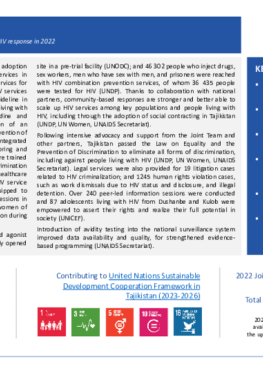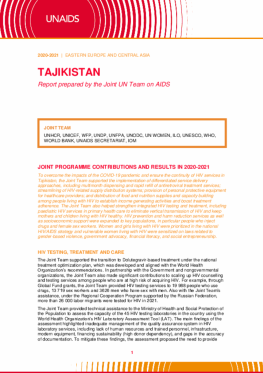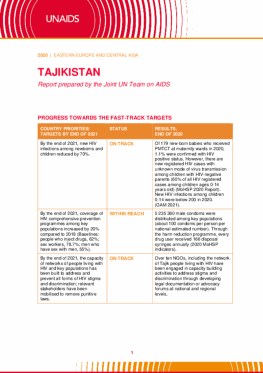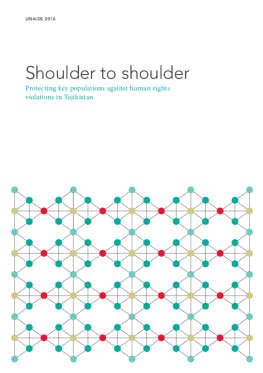|
Tajikistan
In 2024, the Joint Programme helped ensure that people living with or at risk of and affected by HIV had improved access to HIV testing and treatment services. Laboratory services and HIV testing and treatment protocols were strengthened through the revision of national guidelines that are now aligned with global standards. A Quality Management System was also initiated at the National HIV Reference Laboratory, following an expert visit conducted to assess capacity and protocols (WHO).
As a result of the Joint Programme’s efforts, health and non-health professionals were equipped with comprehensive training materials on the updated HIV testing and treatment protocols, including the Undetectable = Untransmittable (U=U) concept (WHO).
The Joint Programme further supported the integration of HIV services into the primary healthcare system, particularly for the elimination of vertical transmission and paediatric care. A national assessment was carried out, identifying gaps in HIV testing during pregnancy and informing improvements in maternal and child health service delivery (UNDP). For example, trainings for about 60 gynaecologists and obstetricians and multidisciplinary support for affected families significantly improved antiretroviral treatment adherence for HIV-positive children. Updated guidelines and advocacy workshops enabled 180 healthcare professionals from antenatal and maternity services to deliver improved HIV services for pregnant women living with HIV and their children (UNICEF, UNFPA, WHO).
Community empowerment and addressing social and structural drivers of the HIV epidemic were also prioritized, including through publication of the study Hearing the Unheard, which highlighted stigma and economic barriers faced by women living with HIV and which led to recommendations for financial, educational and social support (UNAIDS Secretariat).
The Joint Programme provided additional legal support to people living with HIV, including through 20 strategic court cases linked to HIV transmission (UNDP). Additionally, 20 lawyers were trained on human-rights and gender-based legal frameworks, enhancing judicial support for women living with HIV and contributing to ongoing advocacy efforts to revise HIV criminalization laws (UN Women).
Through the Teenergizer network about 400 students improved their knowledge on HIV and sexual and reproductive health. In addition, 170 adolescents living with HIV were empowered through a series of workshops to engage more actively in advocacy to reduce stigma and discrimination against young people living with HIV. Support was also extended to 150 parents and close to 50 paediatricians, enhancing their ability to provide care for children with HIV (UNICEF).
The HIV Sustainability Roadmap, which was developed together with the Joint Programme, will guide the Government of Tajikistan’s commitment to increase domestic HIV funding in the coming years and ensure robust financing for a more sustainable national HIV response (UNAIDS Secretariat).







